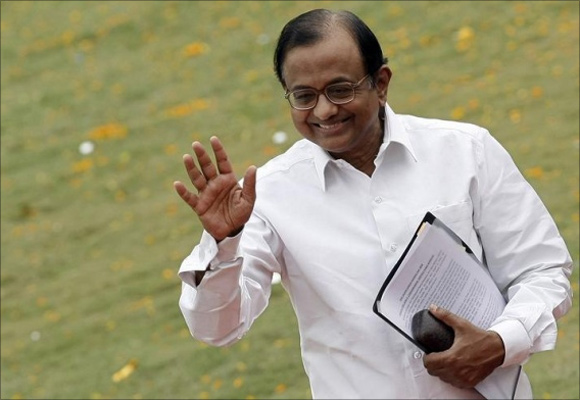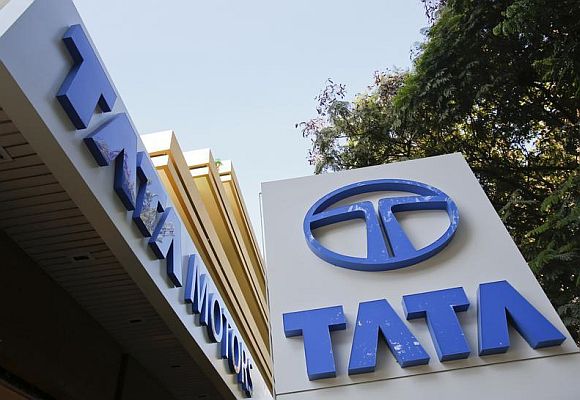
Blame the government’s huge tax demand, while domestic investors point to their falling corporate governance standards.
If corporate historians ever write the history of multinational corporations (MNCs) during Prime Minister Manmohan Singh’s second five-year term, ending in May, they are unlikely to be very generous to him.
There has been a distinct souring of the relationship between India and MNCs.
“The mood among MNCs is not positive and the sharp dip in foreign direct investment is a consequence. As such, there seems to be an anti-MNC sentiment, which is not good for investments into the country,” says Ketan Dalal, joint tax leader of PricewaterhouseCoopers India.
While investors increasingly see MNCs as manipulative, MNCs say India is gradually becoming a difficult place to do business.
...

Various factors have contributed: The slowdown (and the consequent loss of business), the government’s inability to get stuck projects off the board, cancellation of mobile permits following the spectrum scam (two MNCs, Etisalat of UAE and Telenor of Norway, really burnt their fingers in it), and the never-ending Indian corruption. Palms need to be greased at every stage.
Many US-based MNCs find it irksome, with the anti-bribery law in their country expressly prohibiting them from paying bribes in any foreign country.
It is worth remembering Walmart, the world’s largest retailer, exited India after allegations of payment of bribes surfaced last year.
But the biggest block has been the hefty demands by the Indian tax department on top MNCs such as Shell, IBM, Vodafone, Siemens, Nokia, Ingram Micro and Cairn Energy, on issues ranging from capital gains to transfer pricing.
...

Armed with a controversial retrospective tax law which can open cases back to 1962, considered by many a “farewell gift” from former finance minister (now President) Pranab Mukherjee to MNCs, the department has sent demands freely in the past five years.
MNCs have fought back, clogging the courts with appeals, and have warned this will discourage fresh investments.
Though Mukherjee’s successor, P Chidambaram, said he would amend the laws, no concrete steps have taken.
“What has caused the greatest concern to the MNCs is the retrospective change in taxation laws, as well as applying the provisions in a manner that creates uncertainty. I would say it is the uncertainty created in applying taxation laws and the somewhat ad hoc and unclear manner of dealing with the settled legal position that has resulted in the tough time being faced by MNCs in India,” says Daksha Baxi, executive director of law firm Khaitan & Co.
....

A bigger movement
India is not alone here. To be fair, tax lawyers say a lot of the “tax aggression” seen in India has been witnessed in many other countries. The United States tax department, as well as its British counterpart, has taken MNCs to task for evasion and stashing funds in tax havens.
In February 2013, The Economist estimated MNCs have stashed away as much as $20 trillion by making use of tax loopholes across the world. No wonder, then, governments across the world are fighting back.
This is evident from the Organisation for Economic Cooperation and Development (OECD)’s initiative in the Base Erosion and Profit Shifting (BEPS) report, which seeks to plug tax loopholes across the world.
Across nations, tax authorities have become more conscious of their tax base being eroded. India is a part of that global movement.
But MNCs allege India has gone overboard. Tax lawyers say India has some of the highest transfer pricing adjustments made in the last five years, singeing even local Indian companies like Tata Motors and Hindalco, which gave loan guarantees to their foreign subsidiaries for acquisitions abroad.
Lawyers say India is also one of the major contributors to judicial pronouncements on cross-border transactions.
What is BEPS?
According to the OECD, tax laws of individual countries have not kept pace with global corporations, fluid capital, and the digital economy, leaving gaps that can be exploited by companies which avoid taxation in their home countries by pushing activities abroad to low or no tax jurisdictions.
This, the OECD says, undermines the fairness and integrity of tax systems. The project, known as BEPS (Base Erosion and Profit Shifting) is looking at whether the current rules allow for the allocation of taxable profits to locations different from those where the actual business activity takes place and if not, what could be done to change this.
The OECD launched an action plan on Base Erosion and Profit Shifting, identifying 15 specific actions that needed to be taken to equip governments to address this challenge.
...

However, it also needs to be recognised that a large number of issues on which India believes it has a right to tax were expressed 12-14 years ago. For example, India regarded payment for digitised products as ‘royalty’ as early as 2000.
Tax department officials say they are right in taxing MNCs and cite the example of Vodafone.
The department raised a $2-billion demand on Vodafone saying the capital gains tax was not paid by the seller, Hong Kong-based Hutchison, when it sold its 67 per cent stake in its Indian mobile telephony business.
It was one of India’s biggest inbound acquisition investments by any MNC. The IT department argued the financial transaction was routed through tax havens but, because the underlying asset is in India, it should be taxed here.
The Supreme Court of India disagreed. The government, not to be outdone, came out with a retrospective tax law and asked Vodafone to cough up the amount. The matter is now under negotiation between the government and the British company.
...

Another important case is of oil major Shell, which raised its stake in its unlisted Indian company by investing in its shares.
The tax department says Shell undervalued the shares of its Indian company by Rs 15,000 crore (Rs 150 billion) to evade tax and the valuation was not done on an arm’s length basis. The matter is now in the courts.
Meanwhile, the Supreme Court last week rejected Nokia’s appeal over asset transfer to Microsoft. The ruling upheld a lower court verdict over the plant in Chennai, the subject of a tax dispute.
“MNCs are tired of India. Yes, we can understand there is revenue collection pressure on the government but that does not mean MNCs should be harassed,” says a tax lawyer with a large audit firm, who does not want to be named.
Unhappy shareholders
While the tax department is going after them, the minority shareholders of MNCs in India are not happy with the lack of corporate governance. This has resulted in MNCs losing goodwill among investors.
In many cases, the minority shareholders have complained they have been shortchanged by the foreign parent. Take the case of the proposed Maruti Suzuki factory in Gujarat.
It was recently announced the factory will be housed in a fully-owned Suzuki subsidiary, though Maruti is flush with cash. Shareholders are angry that it will be Suzuki, instead of Maruti, which will produce cars, and this will make the Indian subsidiary only a trading company.
...

“There is no compelling business logic for such an arrangement when Maruti had the necessary capital to make investments. It looks like the Suzuki subsidiary will enjoy the benefits of no business risk and assured return on investments, while Maruti will bear the business risk of cyclical sales, pricing pressures, et cetera,” says Shriram Subramanian, founder and managing director of InGovern Research Services.
To appease its disgruntled investors, Maruti Suzuki has decided to give its minority shareholders a chance to approve the decision.
Another sticking point has been royalty. Ever since the government liberalised the royalty rules in 2010, there has been a sharp rise in payouts to foreign collaborators. An analysis by this newspaper of 75 companies listed on the BSE showed royalty payments more than tripled between 2007-08 and 2011-12, though sales grew 80 per cent and net profit a little over 30 per cent.
Proxy advisory firm Institutional Investors Advisory Services has said while the money remitted by the top three royalty-paying companies (Maruti, ABB and Nestle India) jumped over three times from Rs 784 crore (Rs 7.84 billion) in 2007-08 to Rs 2,495 crore in 2011-12, their collective revenue increased only 1.8 times.
It said the four companies had paid no dividends in the past five years, though they had paid Rs 385 crore (Rs 3.85 billion) in royalty to their foreign partners. And, in one case, the Indian company had to fork out royalty to its Japanese promoter though it had reported a loss for the year.
As Business Standard reported last week, Maruti’s royalty payout of Rs 2,453.8 crore (Rs 24.53 billion) in 2012-13 was higher than Suzuki’s standalone profit for the year (Rs 2,402 crore).
...

There are numerous other examples when MNCs failed to win the confidence of small shareholders.
In the past, shareholders, including mutual funds, have complained of valuations favouring MNCs when they decide to merge their Indian businesses or transfer profit-making subsidiaries from local companies to the parent.
There are also cases of companies repatriating cash from subsidiary to parent and launching competing brands, even when a listed company is operating in the country. Many of these transactions are under the tax lens, say government officials.
With both the tax department and minority shareholders getting aggressive, many MNCs have decided to go private. As a first step, Unilever and Glaxo have decided to raise their stake in their Indian subsidiaries to 75 per cent. Unlisted Vodafone has decided to raise its stake in its Indian subsidiary to 100 per cent. Swiss cement major Holcim has merged its two Indian subsidiaries, Ambuja Cements and ACC, in a complex transaction which would increase its stake in the local companies.
Tax officials say the department is taking steps according to the prevalent laws. “Whenever we come across any tax violation, we promise to go after them,” says a senior tax official. And, that is what irks MNCs.
For the new government, it will be a tightrope walk - how to generate higher tax revenue without impacting adversely the country’s business climate? The MNCs, too, need to think of ways to improve their image.